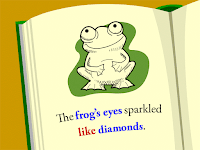PROVERB
AND METONYM
What is proverb?
A proverb is most often a phrase or saying that
gives advice in an obscure
way. The phrase usually has an allegorical type of message behind that when
first heard may seem a little odd. Usually a proverb is very well known because
of its popular use in colloquial language.
Role of Proverbs in Society.
Proverbs play many roles in society :
1. Most common role that a proverb plays
is to educate. Most often tossed around as expert advice in conversation, the
innate role to educate people on what might happen if they do something.
2. Think of a proverb as a little tidbit
of wisdom that just about everyone – no matter where they are from – can offer.
There is a proverb for just about every circumstance, and proverbs can be
applied to any situation.
Example of Proverb
- Early to
bed and early to rise, makes a man healthy, wealthy and wise.
- It’s no
use locking the stable door after the horse has bolted.
- Laugh and
the world laughs with you, weep and you weep alone.
- See a pin
and pick it up, all the day you’ll have good luck; see a pin and let it
lie, bad luck you’ll have all day.
Others
example :
1.
The best things in life are free."
We
don't have to pay for the things that are really valuable, like love,
friendship and good health.
2.
"A stitch in time saves nine.”
Repair
something as soon as it is damaged. That's a small repair job. If not, you will
have a much bigger and more expensive repair job later.
3. "Still waters run deep."
Some
rivers have rough surfaces with waves. That's usually because the water
is shallow and there are rocks near the surface. But deep rivers have no
rocks near the surface and the water is smooth and still. "Still
waters run deep" means that people who are calm and tranquil on the
outside, often have a strong, "deep" personality.
4.
"The way to a man's heart is through his stomach."
Many
women have won a man's love by cooking delicious meals for him. They fed
his stomach and found love in his heart.
5. "If the stone fall upon the egg,
alas for the egg! If the egg fall upon the stone, alas for the egg!"
Life
just isn't fair, and this realistic Arabic proverb recognizes that. The
stone will always break the egg. Life's like that!
What is Metonym?
Metonymy
is a figure of speech in which something is called by a new name that is
related in meaning to the original thing or concept.
Metonymy is common in cigarette
advertising in countries where legislation prohibits depictions of the
cigarettes themselves or of people using them. " (Daniel Chandler, Semiotics.
Routledge, 2007)
The difference between Metonym and
Methapor
Metonymy
is about referring: a method of naming or identifying something by
mentioning something else which is a component part or symbolically linked. In
contrast, metaphor is about understanding and interpretation: it is a means to
understand or explain one phenomenon by describing it in terms of
another." (Murray Knowles and Rosamund Moon, Introducing Metaphor.
Routledge, 2006)
Example of Metonym
- The big house—Refers to prison
- The pen—Can refer to prison or to the act of
writing
- Stuffed shirts—People in positions of
authority, especially in a business
- The crown—a royal person
- The Yankees/The Red Sox/The Cowboys, etc.—any
team name is regularly used as a metonym for the players on the team. This
is a less obvious metonym because often the team name is a group of people
(the Cowboys, for instance), yet of course the football players who make
up the Dallas Cowboys are not, in fact, cowboys.
- The New York Times/Morgan Stanley/Wells Fargo,
etc.—any organization or company name is often used to stand in for the
people who work there, such as “The New York Times stated that…” or “Wells
Fargo has decided….”












